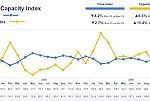
In November 2019, the capacity index compared to the previous month rose again by more than 15 percent. Since October, the short-term supply of available capacity has increased by more than a third overall. On the other hand, transport prices are still only slightly down (-2.7%). This emerges from current evaluations of the Transport Market Monitor (TMM). The online service is supplied by Tim Consult and generated on the basis of real transport data from the spot market of the Transporeon platforms.
Overview of the key developments in November:
- Compared to October, the capacity index has increased 4 percent from 111 to 128 index points. The available transport capacity was thus 6.6 percent higher in November 2019 than in November 2018.
- The transport price index fell from 102.9 to 100.1 index points. This corresponds to a price drop of 2.7 percent. Transport prices were thus 4.2 percent lower than in November 2018.
- The diesel price index was unchanged at 105 index points in November 2019. On the other hand, looking back to November 2018, an increase of 4.8 percent can be observed.
The TMM brings together data from up to 150,000 road-bound freight orders across all industries, which are processed monthly over the spot market by Transporeon. Via an index, the anonymized data coming from Transporeon, is displayed on a timeline and placed in charts for easy comparisons.
”A glance at the TMM shows that transport market prices and capacities tend to develop in line with 2018 over the year. However, transport prices remain above the level observed last year. Worryingly, the available transport capacity has increased again in some key industries. This indicates further cuts in production, but for sure a lower utilization of industrial plants. In the automotive industry, for example, the growth in available transport capacity continued in double digits in November”, says Oliver Kahrs, Managing Director of Tim Consult, a subsidiary of Transporeon.
The high availability of free cargo space in the automotive sector accurately reflects the current problems in the industry: German car manufacturers produced eight percent fewer passenger cars at their domestic locations in November 2019 than in November 2018. Their exports to customers around the world fell by ten percent compared to November 2018, while these exports from plants in Germany since the beginning of the year decreased by 13 percent compared to the same period in 2018 (Source: German Association of the Automotive Industry / VDA).
